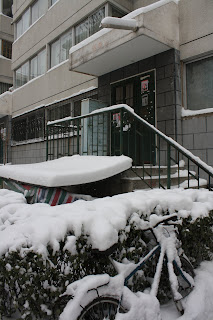Before I get to deep into my observations here, it should be noted that I have worked for and with
DonorPerfect Fundraising Software for the better part of the past decade. I have a fair amount of familiarity with the United States non-profit world, both through this role and through various positions I've held at non-profit organizations, along with knowledge gained from friends and family with similar non-profit and fundraising experience.
When I arrived in China in early 2009, I began to research and try to better understand the NGO and "non-profit" climate here. The term "non-profit" is all but non-existent, and the local and international community generally refers to such groups as Non-Governmental Organizations. These groups generally take on societal roles, responsibilities and projects normally associated with government agencies - but operate in the private sector with private, governmental and international funding.
China's "charity world" is dominated by NGOs. Most are international and raise funds throughout the world via grants and other methods. Many are sub-divisions or the International Monetary Fund, World Bank, United Nations and other globally situated groups. Funds come from member nations and are distributed based on the NGO's current focus and strategy.
This is not to say that there isn't a thriving smaller scale non-profit industry that is blooming in China. Volunteer opportunities abound - with animal shelters, orphanages and schools. And many of these groups operate with a "traditional" non-profit mentality. They fund-raise from large donors and often invest their own time and energy as capital. Many have small scale sponsors and supplement this income with fundraising events, such as concerts, fairs or auctions. Others raise funds by selling merchandise. And still others operate businesses with a non-profit mentality. Such as a thrift shop that donates un-sellable donations to rural communities in need of clothing and random electronics.
I'm aware of many, very small groups that operate with next to no funding at all and are solely sustained via manpower and arrangements with venues that host their events. This enables them to use a public space without paying, as the event is targeted to bring in revenue for the venue via additional sales.
So far, I've encountered very few non-profits or NGOs that operate American (or even European style) fundraising campaigns and I haven't found a single one that uses a sophisticated
donor database system to manage their constituent base and identify and nurture relationships with potential donors. The picture I get is that they are simply too busy and this sort of transition is a large enough paradigm shift that would require a large amount of time and resources.
However, it should be noted that I am mainly aware of English language or at least English language friendly groups. It is also possible that the main reason groups are rarely utilizing such systems to attract Chinese donors is more related to the Chinese donation mentality, coupled with the lack of availability of a Chinese Language donation system.
After the recent earthquakes in China, all public TV stations aired a large gala event that featured a VERY long segment highlighting dignitaries and leaders inserting donation HongBao (red envelopes full of money) into a donation box. There was a long procession and many leaders wrote inspiration phrases on their donation envelopes that the camera focused on. There were phone numbers and physical locations listed and the program encouraged citizens to donate as well. Most donation campaigns I'm aware of are very nationalistic and related to a national tragedies or issues.
Of course, temples and museums have donation boxes as well and many are full of cash gifts. But it is also quite likely that fundraising activities and associated non-profits are not flourishing because of the Chinese reluctance to use credit cards. The Chinese savings rate is tremendous and, while most citizens with a bank account have a debit card, these cards are often for Point of Service (POS) and ATM use only. Its only fairly recent that people are activating their cards to make online purchases.
I don't know the answer and, despite my background and research, I'm no expert.
I'm curious - what is your take on the status of the small nonprofit in China? Are you aware of fundraising campaigns I overlooked?


















